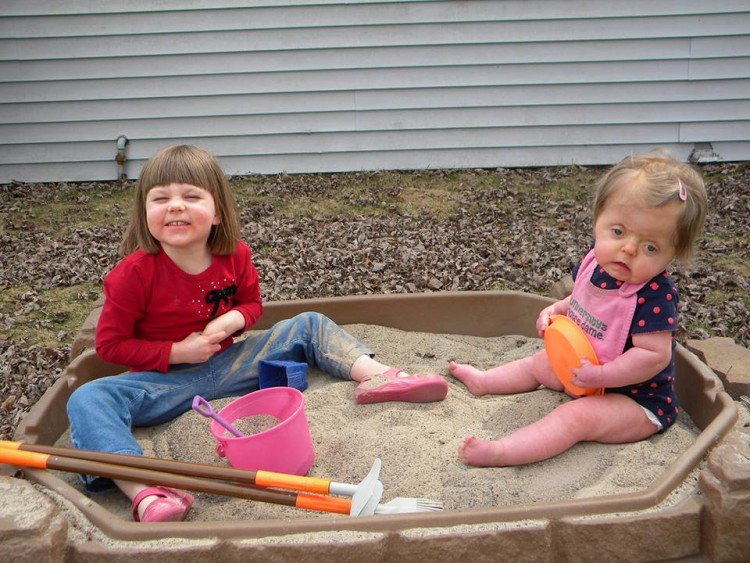5 Times It's Better to Say Nothing at All to a Special Needs Family
As a mom of two girls with special needs, I’ve heard some doozies from well-intentioned people who are trying to assuage the challenging reality of caregiving. I’ve come to understand that people generally don’t know what to say when they learn something difficult about someone – chronic disease, a medically fragile child, an ailing parent with dementia, etc.
While they want to say something in response to their discovery, they aren’t sure what will be helpful. So they likely blurt out something they’ve heard before – a cliché – that they believe will bring you comfort and encouragement.
The truth is, there are moments when I feel it’s better to say nothing at all than any of the following:
1. “Remember to count your blessings, because there are people who have it much worse than you do.”
I think many of us who are facing illness, ongoing grief, or caregiving have heard this one more than once. We may know there are people who have greater hardships than we do, but it’s hurtful to hear someone completely deflect the reality of our current frustrations. Sometimes we may just want a listening and empathetic ear rather than this logic. In fact, guilt can quite possibly trickle in when we hear this, and that’s not something we need more of.
2. “I’m so sorry to hear about your son/daughter’s diagnosis.”
The first time I heard this, I was completely taken aback. I think what startled me was that my first thought was, “But I’m not sorry.”
Naturally, I never wanted my children to face the challenges that come with sensory processing disorder or Apert syndrome or any other diagnosable disease. But when someone told me they felt pity for me because of my daughters’ diagnoses, it stung. I don’t want to elicit sympathy, since I’m grateful for the opportunity to raise such amazing girls.
3. “Special parents get special children.”
On the flip-side, this statement is equally as frustrating to hear as the previous one, though their meanings are entirely opposite. While I do feel that my children are incredible gifts, I do not believe I am anybody “special.” I’m an ordinary mom. I think telling a parent who has a child with special needs that they must be special negates the truth of the matter: that sometimes there are flukes in life, irrespective of who we are.
4. “Don’t worry. Everything will be fine.”
This platitude seems to be the go-to moniker for anything that might cause worry, sadness, fear, anger or frustration. People who say this may not realize how hollow it sounds, even though it can seem to be a perfect way to end an uncomfortable conversation. The truth is, none of us has any way of knowing if everything is going to be fine or not, and I feel it’s unfair and insulting to presume that what we’ve shared will somehow magically end up rosy.
5. “I don’t know how you do everything. I could never do all that you are!”
Here’s the deal: Yes, I believe you would do everything I am doing if you were in my situation. We do all that’s possible and available to help our children reach their potential.
Sometimes that means making huge sacrifices. In my mind, this is simply called love. You do more than you think you are able to do when you love someone wholeheartedly.
BONUS: Don’t mention your problems and say you can relate.
The “one upper” is always a delight, right? I have people tell me how worried they are about their child’s symptoms, or that they were just diagnosed with a rare disease themselves, or that they totally understand what I’m going through because…
I believe no one can know what someone else is dealing with. We can empathize (and I feel we should), but we cannot claim to know what life is like for them.
Sometimes people find a list of “dos” helpful when they aren’t sure how to navigate special needs situations. I happen to think a list of “don’ts” is equally valuable, because most people genuinely want to be consoling and encouraging.
The problem is that few people understand when it’s best to say something and when it’s more appropriate to simply listen with concern. Every time I’ve shared with other moms this unofficial list of “don’ts,” they tell me how relieved they are to know what may be offensive for me to hear. I tend to tell them I think difficult life circumstances seem to warrant more silence than speaking, and it’s best to err on the side of caution rather than say anything at all.

The Mighty is asking the following: Tell us one thing your loved ones might not know about your experience with disability, disease or mental illness. What would you say to teach them? If you’d like to participate, please send a blog post to community@themighty.com. Please include a photo for the piece, a photo of yourself and 1-2 sentence bio. Check out our Submit a Story page for more about our submission guidelines.
